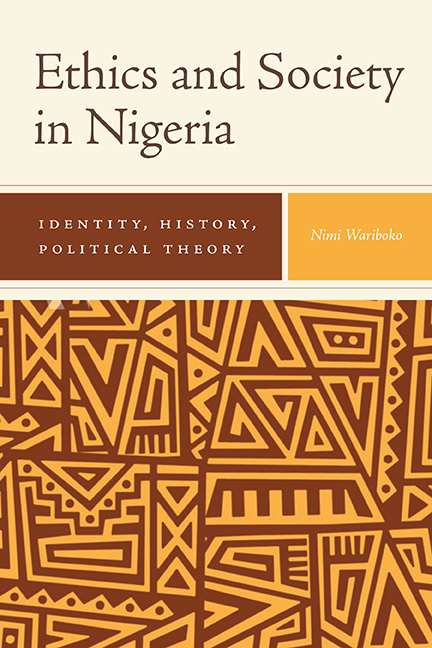Book contents
- Frontmatter
- Dedication
- Contents
- Foreword
- Preface
- Acknowledgments
- Introduction: Dead Gods, Divine Kings, and Deadly Politicians
- 1 The Emergence of the Lotus-Self: Personhood and Identity
- 2 Dead Gods and People's Revolts: Political Theory in Religious Acts
- 3 The Divine King and His Five Bodies: Living History and the Logic of Interreligious Dialogue
- 4 Governance and Deadly Politicians: History as Cultural Criticism
- 5 History without Force: Finding Present Space and Place of Time
- 6 Constructing Nigeria's Greatness: Neglected Paths of Community, Narratives, and Care of the Soul
- 7 Mythos, Virtues, and National Transformation: The Search for a Standard of Citizenship Moral Behavior
- 8 African Traditional Religion and Critical Theory: A Framework for Social Ethics
- Notes
- Bibliography
- Index
2 - Dead Gods and People's Revolts: Political Theory in Religious Acts
Published online by Cambridge University Press: 03 September 2019
- Frontmatter
- Dedication
- Contents
- Foreword
- Preface
- Acknowledgments
- Introduction: Dead Gods, Divine Kings, and Deadly Politicians
- 1 The Emergence of the Lotus-Self: Personhood and Identity
- 2 Dead Gods and People's Revolts: Political Theory in Religious Acts
- 3 The Divine King and His Five Bodies: Living History and the Logic of Interreligious Dialogue
- 4 Governance and Deadly Politicians: History as Cultural Criticism
- 5 History without Force: Finding Present Space and Place of Time
- 6 Constructing Nigeria's Greatness: Neglected Paths of Community, Narratives, and Care of the Soul
- 7 Mythos, Virtues, and National Transformation: The Search for a Standard of Citizenship Moral Behavior
- 8 African Traditional Religion and Critical Theory: A Framework for Social Ethics
- Notes
- Bibliography
- Index
Summary
History is the retrieval of the past. The reconstruction of Nigeria's social-ethical identity demands that we unearth the emancipatory potentials of her past.
The Gods Are Not Untouchable
Long before Nietzsche's madman in the market shouted, “God is dead … And we have killed him,” the Kalabari people (Izon, Niger Delta, Nigeria), on September 27, 1857, announced to Africans and Europeans in the Niger Delta that they had just killed one of their gods (Owu Akpana, the Shark-god) and proceeded to celebrate the deicide and its implications for their freedom. This act, which was not metaphysical but historical, involved eating the divine flesh and drinking the blood of the god, incorporating the divine in the human and thus recognizing sovereignty in the people. Like a caterpillar they burst asunder the cocoon of spiritual-political hegemony that divided them from their sovereignty, so that the hegemony crumbled away. All gods in Kalabari— except one, the supreme being Tamuno/Tamarau—became vulnerable to death at the hands of their worshipers as a community. Put differently in Lacan's felicitous phrase, the gods were always already dead, they just did not know it. The Shark-god found this out the hard way. Indeed, the September disruptive act mobilizes three ethico-political elements: human beings are the immanent obstacle that prevents the sacred from achieving full self-identity; the political is the immanent Spirit of the community, and materialization of some higher or untouchable power or reality could be cast down to nothing.
Before Nietzsche's madman threw his lantern on the ground on seeing the astonishment on the faces of his listeners and declared, “I have come too early, my time has not come yet,” the death of God was already functioning as a concept in Kalabari, and not as a mytho-poetic thought to awaken people from their slumber of transcendence. With the execution of the Owu Akpkana, the preconceptual thought of deicide instantly transformed from thought to material act to an ideal entity. This is precisely the moment two revelations traversed Tamarau herself: the people as demos as well as a Spirit (a community of organized believers as divine, sacred energy, amatemeso) is a disruptive, interruptive power, and the natality of political notion that haunts all claims of exception and givenness.
- Type
- Chapter
- Information
- Ethics and Society in NigeriaIdentity, History, Political Theory, pp. 35 - 50Publisher: Boydell & BrewerPrint publication year: 2019



